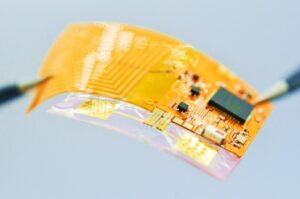
Scientists from the University of North Carolina at Chapel Hill have introduced an innovative drug delivery system poised to transform the approach to treating neurodegenerative disorders and neurological injuries. The Spatiotemporal On-Demand Patch (SOP) is a cutting-edge technology that marries convenience with precision in medical treatment.
At first glance, the SOP might be mistaken for a simple Band-Aid due to its familiar design. However, this small device packs a punch with its ability to release medication wirelessly, triggered by a command. This feature marks a significant step forward in patient comfort and convenience, as it allows individuals to receive localized treatment without repetitive medical appointments.
The SOP’s effectiveness was initially demonstrated in a mouse model using melatonin to enhance sleep quality. Encouraged by these results, researchers have now embarked on piloting the technology for Alzheimer’s disease treatment. The SOP has the potential to administer multiple drugs simultaneously, tackling various facets of complex diseases like Alzheimer’s.
A standout feature of the patch is its ability to target medication delivery to specific body regions with remarkable precision. Upon receiving an electrical signal, the SOP can trigger drug release within an impressive 30 seconds, showcasing both its speed and responsiveness.
The secret behind the patch’s safeguarding of both drugs and tissue lies in its gold-coated microneedles. These needles dissolve upon electrical stimulation, ensuring a smooth release of medication into the patient’s system.
Funding support for this project comes from the National Science Foundation and the National Institutes of Health.


